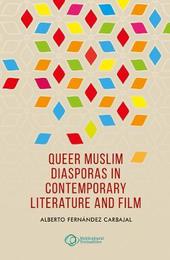
|
Queer Muslim Diasporas in Contemporary Literature and Film
Paperback / softback
Main Details
| Title |
Queer Muslim Diasporas in Contemporary Literature and Film
|
| Authors and Contributors |
By (author) Alberto Fernandez Carbajal
|
| Series | Multicultural Textualities |
|---|
| Physical Properties |
| Format:Paperback / softback | | Pages:296 | | Dimensions(mm): Height 234,Width 156 |
|
| Category/Genre | Films and cinema
Islam |
|---|
| ISBN/Barcode |
9781526151803
|
| Classifications | Dewey:809.8921297 |
|---|
| Audience | | General | | Tertiary Education (US: College) | | Professional & Vocational | |
|---|
| Illustrations |
7 black and white illustrations
|
|
Publishing Details |
| Publisher |
Manchester University Press
|
| Imprint |
Manchester University Press
|
| Publication Date |
8 September 2020 |
| Publication Country |
United Kingdom
|
Description
This book explores the representation of queer migrant Muslims in international literature and film from the 1980s to the present day. Bringing together a variety of contemporary writers and filmmakers of Muslim heritage engaged in vindicating same-sex desire, the book approaches queer Muslims in the diaspora as figures forced to negotiate their identities according to the expectations of the West and of their migrant Muslim communities. The book examines 3 main themes: the depiction of queer desire across racial and national borders, the negotiation of Islamic femininities and masculinities, and the positioning of the queer Muslim self in time and place. This study will be of interest to scholars, as well as to advanced general readers and postgraduate students, interested in Muslims, queerness, diaspora and postcolonialism. It brings nuance and complexity to an often simplified and controversial topic. -- .
Author Biography
Alberto Fernandez Carbajal is Lecturer in English Literature at the University of Roehampton -- .
Reviews'With astounding skill, Carbajal manages to carve a unique space for Muslim queerness within the diaspora-a space that he defines as quotidian, yet nonnormative, and makes intelligible that which is inconceivable within the strictures of empire... Alberto Carbajal's monograph beautifully destabilizes assumptions of queer diasporic Muslim identity and seeks to not only illustrate the ways queer Muslims micropolitically redefine the hegemonic norms of heteronormative patriarchy, but also considers the multitude of ways they disorganize boundaries and categories within the everyday modes of action and affect.' Journal of Religion & Film -- .
|